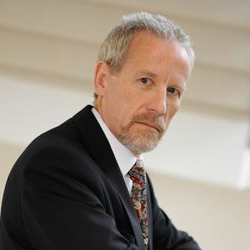
by Keith Grint
Emeritus Professor, Warwick University, UK
15 May 2020
Share:
In 1646, as the First English Civil War drew to a close, a song called “The World Turned Upside Down” was written in response both to the war in general and the banning of Christmas celebrations in particular. Surely it is an appropriate title for the world we currently live in, for many aspects of our daily normality have been turned upside down by the Corona virus. Indeed, it is not just our routines that have disappeared but also what counts as normal in politics, as Prime Minister Johnson and President Trump, both avid adherents of free market philosophies, engage in state bailouts, income support, and centralised controls that would not look amiss in the Soviet Union of old or the contemporary regime in China.
And yet, despite the radical about-face in the USA and the UK, as the free market has shown its limits, the virus has also revealed some of the contemporary myths which we live by, to be equally suspect. Both the UK and the USA have taken different strategic responses than most of their European allies or even their global competitors, often on the basis that the Anglo-Saxon cultures are “exceptional” by comparison to others – i.e., superior to them. The empirical data suggests that they are exceptional, but often in a negative sense, though the full results will only be clear when this is all over. Partly this is rooted in what David Collinson called the “Prozac Leadership” embodied by both leaders and their administrations – the over-emphasis on the positive and the denial of any bad news – and partly it is to do with the failure to understand the nature of the problem facing them, and thus to take inappropriate and inadequate responses. The former is a personality issue, the latter is a more systemic problem because the governments of both Johnson and Trump have decried the value of science and experts for so long that the volte-face required to bring science back to the political stage has proved difficult. Indeed, the U-turns, claims, and counter-claims about the problem and the availability of medical equipment reminds me of Winston, the main character in Orwell’s 1984, fretting over how many boots he should report that had been delivered: “The Ministry of Plenty’s forecast had estimated 145 million pairs. The actual output was given as 62 million… Winston marked the figure down to 57 million… In any case, 62 million was no nearer the truth than 57 million or 145 million.”
Winston was not alone in either his confusion about the number of boots or the nature of “‘the enemy.” In my own village near Oxford, England, the first rumours of a “virus carrier” led to a social media frenzy as otherwise friendly neighbours went searching online to detect the infected house, in a symbolic reversal of the tale in Exodus 12:13, where blood on the door is taken as a sign to god that the plague will not take those dwelling inside. The idea that hitherto integrated communities could turn on each other so swiftly in times of crisis should not be a surprise: we only need to look at the Balkans War in the 1980s to see how quickly neighbours would “cleanse” themselves of the “enemy” under specific conditions. These are reminders of how thin the veneer of civilisation can sometimes be – and why it is the responsibility of political leaders to reinforce our collective struggle against the virus, not against the alleged enemy next door.
This tendency to perceive the “enemy within” as the threat, rather than the actual virus, is compounded by the way leaders adopt particular forms of language. Invoking metaphors of war and calling the population to arms might be essential under threat of an actual enemy invasion, but this is an existential crisis, like the environmental threat but unlike the World Wars. As such, the language should reflect our common human values not distinct nationalist values, because the virus does not have a nationality and is uninterested in political boundaries: a global pandemic requires a global, not a nationalistic response.
The role of leadership, then, is not to pretend that the unique values of the country will save them, but to support those that need help, and suppress those that remain irresponsible, for whatever reasons.
The pandemic has also exposed the good and the bad side of society. Dickens’ Tale of Two Cities starts with the following line: “It was the best of times, it was the worst of times, it was the age of wisdom, it was the age of foolishness, it was the epoch of belief, it was the epoch of incredulity, it was the season of light, it was the season of darkness, it was the spring of hope, it was the winter of despair.” And times such as this do indeed bring out the best and worst in us – and always have done – as ambulances in the UK are sometimes attacked by the ignorant while elsewhere legions of volunteers put themselves at risk to help those less fortunate.
The role of leadership, then, is not to pretend that the unique values of the country will save them, but to support those that need help, and suppress those that remain irresponsible, for whatever reasons. That judicious combination of Commander and Leader is never simple, but it is necessary. In Trump’s case the commander is often decisive, but the direction changes dependent upon the polls. In Johnson, a man hitherto famous for the attributions of a clown rather than a commander, we British have a leader who has had great difficulty becoming the commander. But the most dangerous contemporary commander seems to be the Indian Prime Minister, Modi, whose decision to quarantine the country with just a few hours’ notice, and with little apparent planning for the consequences of the decision on the poorest members of Indian society, has seen a mass exodus from the cities that only made the problem worse. When being decisive, as a Commander should be, it is important not to be decisively wrong.

Keith Grint is Professor Emeritus at Warwick University. He has held Chairs at Cranfield University and Lancaster University and was Director of Research at the Saïd Business School, Oxford University. His books include The Arts of Leadership (2000); Organizational Leadership (with John Bratton and Debra Nelson); Leadership: Limits and Possibilities (2005); Leadership, Management & Command: Rethinking D-Day (2008); and Leadership: A Very Short Introduction (2010). He is writing a book on Mutiny. He received ILA’s Lifetime Achievement Award in 2018.

